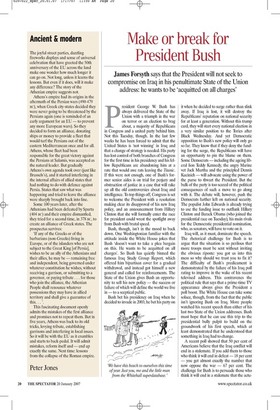Ancient & modern
The joyful street parties, dazzling fireworks displays and sense of universal celebration that have greeted the 50th anniversary of the EU across the land make one wonder how much longer it can go on. Not long, unless it learns the lessons. But even if it does, will it make any difference? The story of the Athenian empire suggests not.
Athens's empire had its origins in the aftermath of the Persian wars (490-479 BC), when Greek city-states decided they were never going to be threatened by the Persians again (one is reminded of an early argument for an EU — to prevent any more European wars). So they decided to form an alliance, donating ships or money to provide a fleet that would turf the Persians out of the eastern Mediterranean once and for all. Athens, whose fleet had been responsible for the great victory against the Persians at Salamis, was accepted as the natural leader. But gradually Athens's own agenda took over (just like Brussels's), and it started interfering in the internal affairs of allied states that had nothing to do with defence against Persia. States that saw what was happening and tried to leave the alliance were sharply brought back into line.
Some 100 years later, after the Athenians had been defeated by Sparta (404 BC) and their empire dismantled, they tried for a second time, in 378 BC, to create an alliance of Greek states. The prospectus survives: 'If any of the Greeks or of the barbarians (non-Greeks) living in Europe, or of the islanders who are not subject to the Great King [of Persia], wishes to be an ally of the Athenians and their allies, he may be — remaining free and independent, being governed under whatever constitution he wishes, without receiving a garrison, or submitting to a governor, or paying tribute . . . for those who join the alliance, the Athenian People shall renounce whatever possessions they may have in allied territory and shall give a guarantee of this. . .
This fascinating document openly admits the mistakes of the first alliance and promises not to repeat them. But in five years, Athens was back to its old tricks, levying tribute, establishing garrisons and interfering in local issues. So it will be with the EU as it crumbles and starts to back-pedal. It will admit mistakes, reform itself and — end up exactly the same. Next time: lessons from the collapse of the Roman empire.





















































 Previous page
Previous page